Booking Holdings: Consistent Market-Share Gainer At A Discount (NASDAQ:BKNG)

[ad_1]
Kobus Louw/E+ via Getty Images
If you’re a concentrated investor like me, you’d want to pick the industry leader, rather than gain unnecessary exposure to lower-quality names.
Booking Holdings (NASDAQ:BKNG) is one of the most prominent names in the online travel market, which I view as an attractive way to capitalize on the ever-growing demand for experiences, as the world’s GDP continues to rise and people’s desire for travel never ends.
Is Booking the best horse to pick in this race? Let’s find out.
Online Travel Market
Travel is arguably people’s most desired experience. It’s the best way to create happy memories, and despite its discretionary nature, I don’t know too many people who regret spending their hard-earned money on travel.
It’s then no surprise that travel as a percentage of global GDP is on a secular rise, as people become wealthier and have more spare money available for travel. In 2019, the travel & tourism share of GDP reached an all-time high of 10.4%, a level that’s expected to be surpassed in 2024.
To understand the underlying growth drivers of this industry, I’ll use a quote from Glenn Fogel, Booking’s CEO:
If we agree that over time, world GDP will continue to increase and per capita GDP will continue to increase, it’s fairly logical that as people get wealthier, they’re going to spend more of their money on things that are services or experiences. Once you are rich enough to have, let’s say an apartment, or you have one sofa, you’re not going to buy a sofa or an apartment each year. What you’re going to do is you will travel either more frequently or in a higher level or you’ll do both. We see that over and over again, as GDP per person goes up, travel increases, too.
— Booking Holdings Q3’23 Earnings Call [edited by author].
Generally, the travel value chain consists of transportation, accommodation, and attractions. Every link in this chain represents a highly fragmented and competitive market, with diversified customer cohorts from all levels of income and different kinds of preferences.
For example, transportation includes dozens of airlines, some low-cost, some luxury, some are business-oriented, and some are a mix between all of those. Accommodation is similar, with hotels, hostels, camping, apartments, and more.
In today’s connected world, marketplaces like Booking provide a unique opportunity to capture value from many links across the value chain, as they offer a range of accommodation options, transportation, and a wide variety of attractions.
Not only does Booking have the most expansive presence in the value chain, but it’s also technology-driven, with low capital requirements and relatively high profit margins, unlike the actual end-product providers.
Therefore, as a basis for discussion, I find it as a great vehicle to invest in the travel industry.
Business Overview
Booking Holdings owns several brands in the online travel agency market, including the name brand Booking.com, as well as Priceline, Agoda, Rentalcars.com, Kayak, and OpenTable. The overwhelmingly significant part of the business is Booking.com.
Booking operates as an online agency through which travelers can book accommodation, and during the last couple of years, the company expanded its offering to flights, attractions, and transportation.
Consistent Share Taker From Expedia And Airbnb
For the sake of this section, I compiled the numbers of Airbnb (ABNB), Booking, and Expedia (EXPE), three of the largest online travel marketplaces in the world, which also happen to be public companies. Therefore, this is entirely based on their public data, rather than third-party numbers which are less coherent and difficult to rely upon.
Another important note, if you listen to their earning calls, you’ll see their respective managements all say they’re taking share and outgrowing their competitors. This may be true if we include the smaller players in the space, but if we look only at those three, obviously, they can’t all be share-gainers.
Gross Bookings
In 2023, Booking had gross bookings of $150.6 billion, Airbnb had $73.3 billion, and Expedia had $104 billion, for a combined $328.0 billion.
Created by the author using data from the companies’ financial reports.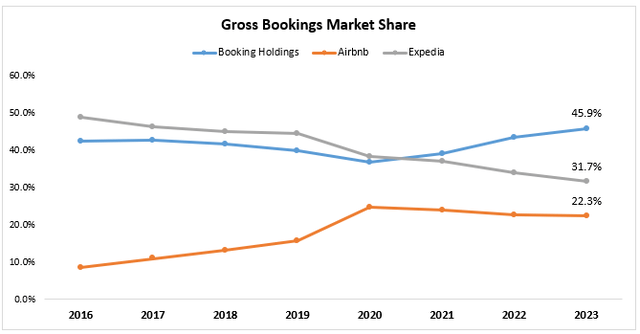
As we can see, Booking achieved a 45.9% share, an eight-year record, with both Expedia and Airbnb losing share. On a longer timeline, we can see that between 2016-2019, Airbnb took share from both Booking and Expedia, with the latter being the primary loser. Then, Covid-19 came, during which most hotels were shut down, leading to an unusual year in the industry.
Post-pandemic, from 2021 to today, Airbnb stalled in the 22%-23% range, while Expedia is bleeding share to Booking.
Room Nights
Gross bookings include all kinds of bookings made on the platforms, which in Expedia’s and Booking’s case means flight and transportation as well. Therefore, room nights should provide another angle as to the market position of the companies, specifically in accommodation, and also make up for price differences.
In 2023, total room nights booked on the three platforms amounted to 1.84 billion, with Booking at 1.05 million nights, compared to Airbnb and Expedia at 448 million and 351 million, respectively.
Created by the author using data from the companies’ financial reports.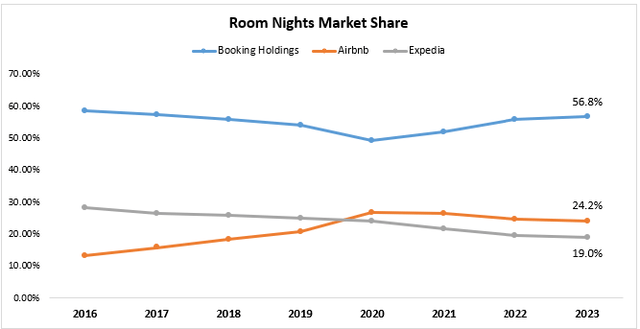
Similarly to the gross bookings trend, Booking achieved a seven-year record in terms of share, coming in at 56.8%, whereas Airbnb had 24.2% and Expedia at 19.0%. While Airbnb regressed to its pre-pandemic trend, Expedia has been losing market share consistently since 2016.
Take Rates
With Booking’s aggressive share gains, one could expect declining take rates, meaning that the platform is giving up revenues to acquire customers. However, that is not the case.
Created by the author using data from the companies’ financial reports.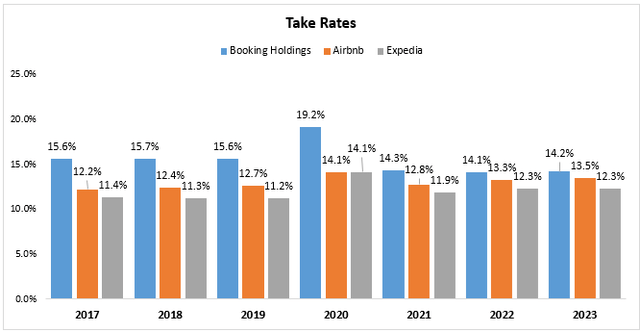
Calculated as total revenue divided by gross bookings, we can see that Booking has the highest take rate among the three historically. That being said, Booking is the only one between the three with a lower take rate in 2023 compared to 2021, albeit very marginally.
The decline in Booking’s take rate, in my view, is primarily attributed to the additions of products like flights, which have a lower take rate.
Flights
This is only relevant to Booking and Expedia.
Since Booking started reporting the number of flight tickets booked on its platform in 2021, we’ve seen significant growth in that area. Booking facilitated 36 million air ticket transactions in 2023, which is more than double the amount it booked in 2021.
Created by the author using data from the companies’ financial reports.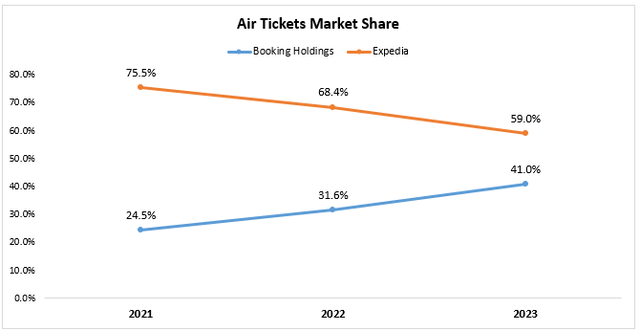
Expedia has been growing much slower during this period, leading to significant share losses. In 2021, Booking had below a 25% share, and in 2023, it reached 41%.
Despite Being A Leader, Booking Trades At A Discount To Airbnb
Operationally, I think we can conclude Booking is the number one player in the market. The company consistently takes market share across every line item, while maintaining industry-leading take rates.
It also has the highest operating and free cash flow margins between the three and had the highest growth rates over the past three years (with 2020 as a baseline).
Considering all that we discussed above, I’d expect Booking to be trading at a premium. However, that is not the case.
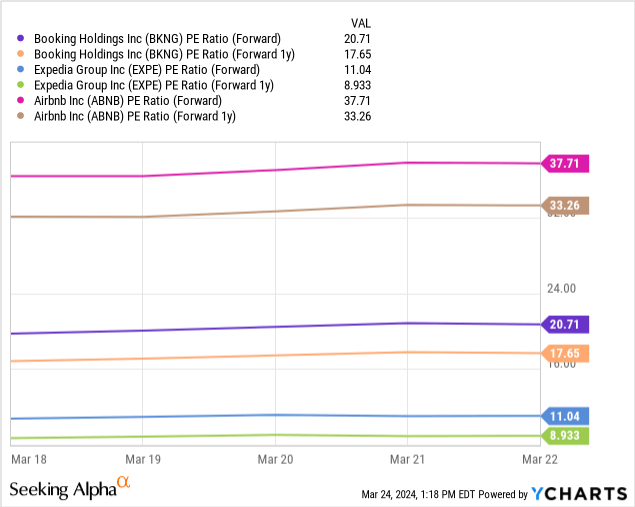
As we can see, Booking is trading at a 20.7x P/E over expected 2024 EPS, and 17.7x over 2025. Airbnb is trading at 37.7x and 33.3x over 2025, reflecting 82% and 88% premiums, respectively.
Expedia is much lower than Booking, but as it continues to lose market share, I find its lower valuation justified.
Importantly, in 2025, Booking’s EPS is expected to grow by 17.3%, and Airbnb is expected to grow by 14.1%, resulting in respective PEG ratios of 1.0x and 2.4x.
Valuation
So, relative to peers, I find Booking attractive. We still need to estimate whether Booking is an attractive investment.
Today’s 20.7x multiple is a low level historically for the company. Prior to the pandemic, the only relevant year to look at in terms of historical valuation for Booking was 2019. We can see that back then the stock was trading in the 20x-23x range.
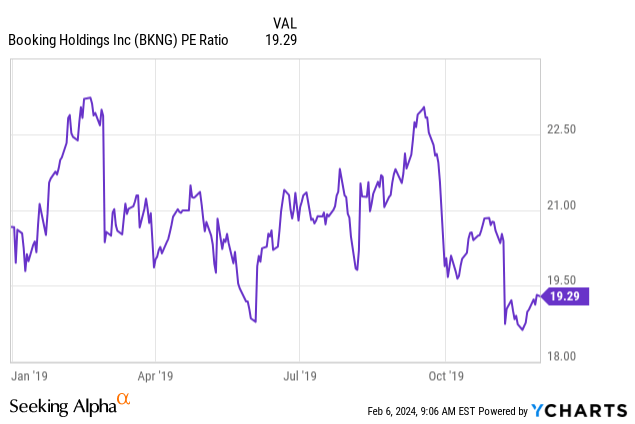
Arguably, this shows us that Booking is trading at the low end of its valuation range. But there’s more to that story.
Today’s Booking is a different company.
It has more presence in the value chain with flights, transportation, and alternative accommodation. It has a stronger brand, with more than half of its bookings coming straight from its app, and a more expansive customer loyalty program. Furthermore, it built a comprehensive payment processing system, which helps it capture more value in every transaction.
As such, I believe Booking should recover back to the high-end of the range in the near term. Based on EPS estimates of $175.0 for 2024, I estimate Booking’s fair value at $3,940 a share, based on a 22.5x P/E, providing us a near-term upside of 9%.
Risks
As I said, I expect Booking will return to the high end of its valuation range by the end of the year. That said, there are several risks that might prevent that from happening and are currently weighing down on the stock.
First, economic slowdown. A looming recession is a 2-year-old story, and while it is yet to come, we’re seeing signs of a more price-conscious consumer. Travel is a discretionary spend, and it can be crossed off the spending list pretty easily. We haven’t seen this in the company’s results so far, as demand was so strong post-pandemic, but the company’s guidance for 2024 suggests a return to normalized levels.
Second, increasing geopolitical tensions. The company said the Middle East conflict negatively impacted results in Q4’23, and they expect it to be a 1% drag on revenue growth for 2024. As the crisis continues to develop, it’s possible the impact will be more significant than initially thought, although Booking’s management has a track record of being very prudent with guidance.
Lastly, regulation. Booking is facing a $530m fine in Spain over anti-competitive behavior and is being probed by Italy’s antitrust body as well. Furthermore, the company, which has a history of acquisitions, was blocked by the EU in a recent attempt to acquire Etraveli, an online flight agency.
Overall, I think those risks are the main reason Booking is trading at a 20x P/E, which means they are priced in, and I find them temporary.
Conclusion
I find the travel industry to be an attractive place for investment, as it’s way less cyclical than people tend to think. I’d say it’s a sector with sequential growth, riding the growth in wealth and digitalization, that experiences occasional cycles.
I view Booking as the clear leader, with consistent market-share gains and industry-leading profitability.
With increasing worries about an economic slowdown, growing geopolitical tensions, and higher regulatory pressures, I find it reasonable that the company is trading at the low end of its valuation range.
However, I believe Booking is well-positioned to capitalize on the industry’s growth as we come out of this temporary downturn.
Therefore, I rate Booking a Buy and encourage investors to start accumulating shares at these levels.
[ad_2]
Source link















